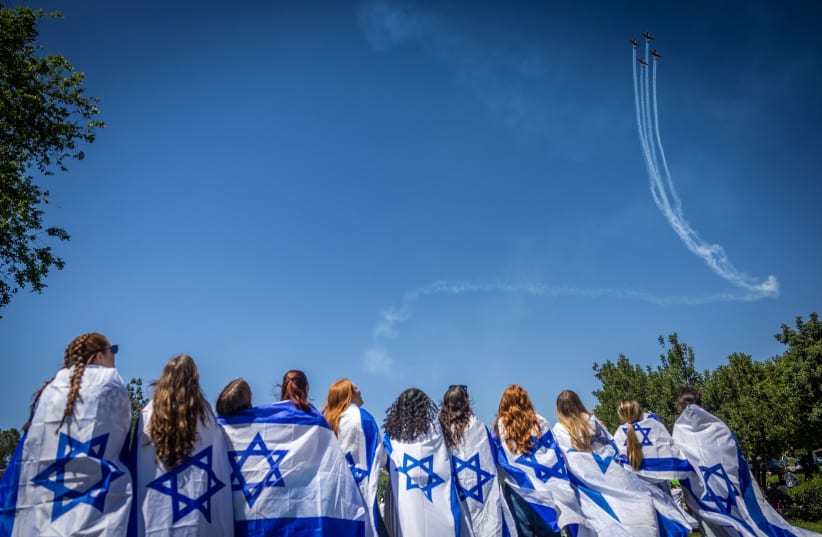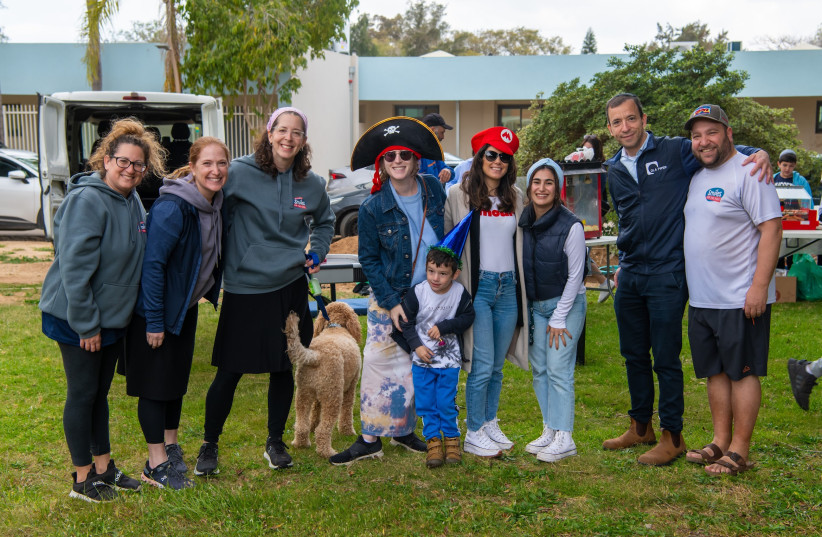(JTA) - Last year, Congregation Kol Ami in Seattle decided to forgo a standard celebration of Israel’s Independence Day to address the turmoil besetting the country - a nod to what Rabbi Yohanna Kinberg called the “emotional reality of a lot of Israelis.”
That event focused on the country’s controversial judicial reform, which at the time was the subject of mass protests and global debate. One year later, Israel is again far from tranquil. And in the face of the country’s seven-month hostage crisis and war against Hamas in Gaza, Kinberg says Kol Ami is again opting against a “festive and nationalistic” approach.
Like last year, the congregation will frame its Independence Day ceremony around celebrating Israeli democracy. Attendees will hold a study session on its Declaration of Independence and sing Israel’s national anthem.
“My hope and intention in doing this and talking about Israeli democracy is that we’ll be able to engage with the spirit of Yom Haatzmaut,” Kinberg told the Jewish Telegraphic Agency, using the day’s Hebrew name and adding that the holiday is an opportunity to work toward “actualizing the dream of Theodor Herzl,” the founder of Zionism.
Like Kol Ami, congregations and communities across the country are grappling with how to celebrate Yom Haatzmaut, Independence Day in Hebrew, which begins Monday night, in the midst of the Israel-Hamas war. The day is generally taken as a time to celebrate Israel’s founding, culture and accomplishments, replete with food, song and dance. But this year - in the face of fighting in Gaza, solemnity in Israel and a reported spike in antisemitism at home - many ceremonies are addressing the complex feelings of the moment head-on.
“It’s important to acknowledge the war and the emerging drumbeat of antisemitism in the United States, and the need to support Israel’s right to exist as a democratic Jewish state,” said Adam Hertzman, associate vice president of marketing for Pittsburgh’s Jewish federation.
Kibbutz experience
Hertzman’s federation will be hosting a march for Israel as well as a performance by the Israeli band HaShayara, whose members hail from Kibbutz Eshbal in northern Israel, not far from the border area that has been under rocket fire from Hezbollah since October 7. The band’s members will share their experiences of living through the war.
Jewish Silicon Valley, an umbrella Jewish community group in the Bay Area, is also highlighting the kibbutz experience in its Yom Haatzmaut programming, with a focus on the communities attacked in Hamas’ October 7 invasion of Israel.
It is marking Yom HaZikaron, Israel’s Rememrance Day - which is observed from Sunday night to Monday and leads into Independence Day - with an exhibit created by eighth graders about the hostages. The program will then transition to an Independence Day celebration focused on the role of the kibbutz - traditionally small, socialized farming collectives - in Israeli society.
“The theme of kibbutzim is the connecting part for October 7, because many of the affected places were kibbutzim,” Maya Tripp, Jewish Silicon Valley’s Jewish life and culture director, told JTA. Tripp, who is Israeli, said the program will represent “the dissonance between the tranquility of the kibbutz and what happened on October 7,” when several border kibbutz communities had hundreds of residents killed or taken hostage.
The event will highlight some of those communities and will feature a table with information about the hostages and how to advocate for their release. Attendees will also participate in a flower-making project centered on Israel’s national flower, the red anemone, which carpets portions of southern Israel, where the devastation of October 7 occurred.
M²: The Institute for Experiential Jewish Education commissioned Jerusalem-based designer Eli Kaplan-Wildmann to create a series of postcards with discussion questions as well as themes - presented in both English and Hebrew - such as loss, fear and hope. On the back of a card depicting a broken plate is the word “Shatter” along with the prompt, “What is an idea or a feeling that shattered for you?”
“One of the messages is that there is grief, but there’s also growth,” Kaplan-Wildmann told JTA. “The cards show a progression of sorts, and it starts with brokenness, but it ends with a flowering, or a blossom.”
Kaplan-Wildmann said it was important to make space for all the emotions people are feeling, and to offer an educational resource that provides structure when many feel lost.
“Pictures are indeed worth a thousand words,” he said. “It’s a time when we barely have any words to describe what we’re feeling and how we can even process what’s going on, and images are able to help us.”
Yom Haatzmaut ceremonies are also shifting around the world, not least in Israel itself, where nearly a third of Israelis said there should be no celebrations of the day at all this year, according to a recent poll. As it is, the country’s official ceremony will not include fireworks because of the war and complaints from military veterans about the blasts triggering PTSD symptoms. Prime Minister Benjamin Netanyahu is reportedly planning to skip some official holiday events, and in the north, some Israelis plan to spend the day protesting their government.
RELATED: Opinion: How can I celebrate Israel’s Independence Day when my country is in turmoil?
Anti-Israel protests could also affect the holiday. In at least one case, in Ottawa, Canada, the specter of demonstrations led the city to initially cancel its Israeli flag-raising ceremony, citing security concerns. But after the local Jewish community objected to the decision and planned its own rally, the mayor reversed course.
And in light of the war, some Jewish organizations are spotlighting Palestinian as well as Israeli narratives. The Reconstructing Judaism movement produced a set of resources for the holiday this year, noting that “with the prospect of ongoing military action in Israel/Gaza, we know that this day may feel more challenging than usual.”
Along with suggesting traditional programs such as celebrating Israeli food and music, the guide includes several options that depart from standard Yom Haatzmaut observance and direct attention toward Palestinian perspectives. The guide recommends that congregations could read books “that center Palestinian narratives and stories,” including material on the Nakba, the term denoting the mass displacement of Palestinians that accompanied Israel’s war for independence. The guide also suggests ways to “center the tension” of the Israeli-Palestinian conflict, in part by inviting local Israelis and Palestinians from the community to share their experiences.
Other Jewish leaders and organizations are encouraging communities to overcome the urge to turn this year’s holiday into a solemn event. The Shalom Hartman Institute offered a guide for Yom HaZikaron and Yom Haatzmaut in which the think tank encourages communities to “continue singing the rich music of Israel.”
“As difficult as it may be this year, pausing to lift our voices in song testifies to our determination that better days lie ahead,” write Rabbi Jessica Fisher, the organization’s director of rabbinic enrichment, and Sara Labaton, Hartman’s director of teaching and learning. “The struggles of the past did not drown out the music of Yom HaAatzmaut and neither should the events of this year.”
Not far from Kol Ami, some Seattle Jewish groups and synagogues are holding traditional, festive Yom Haatzmaut celebrations. Another local congregation, Temple De Hirsch Sinai, is hosting a debate on anti-Zionism and antisemitism. Kinberg said that, taken together, the mix of offerings feels like the right balance for a complicated holiday at a fraught time.
“The Seattle area, it’s not an easy place to be a Jew right now,” Kinberg said. “So I wanted to make sure there were a lot of options for people to feel comfortable, safe and nurtured by their Jewish community.”

